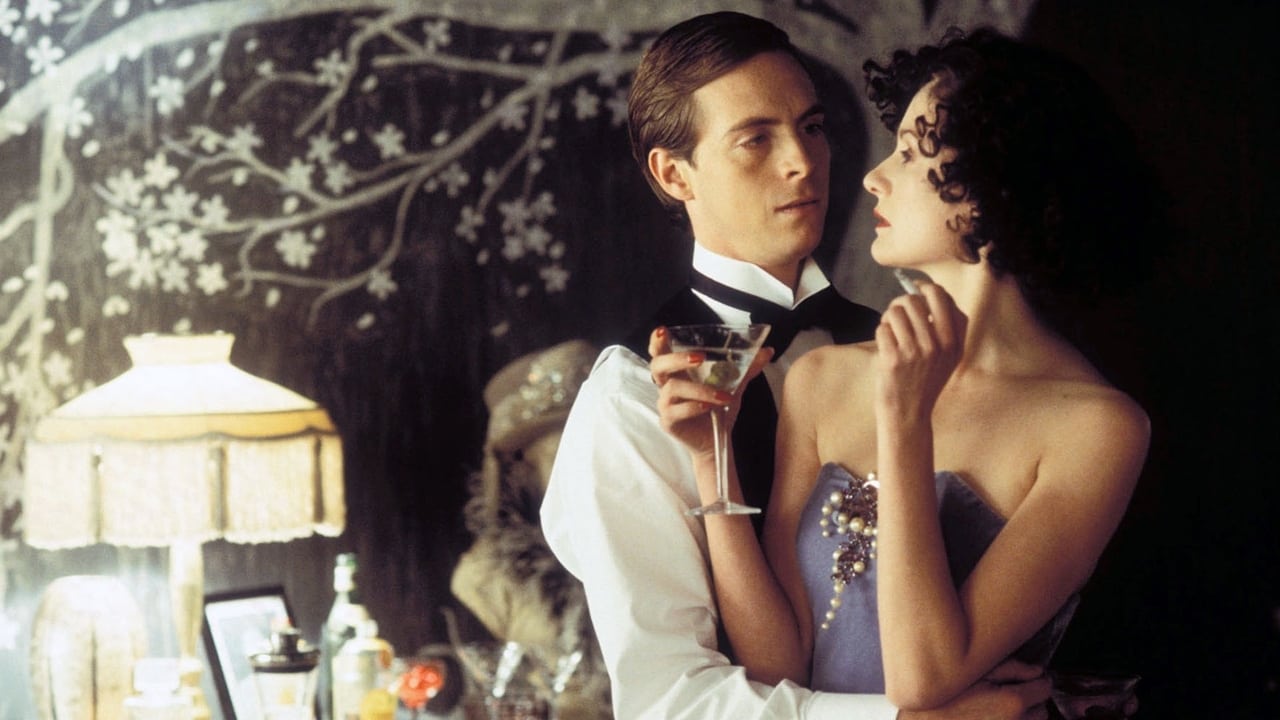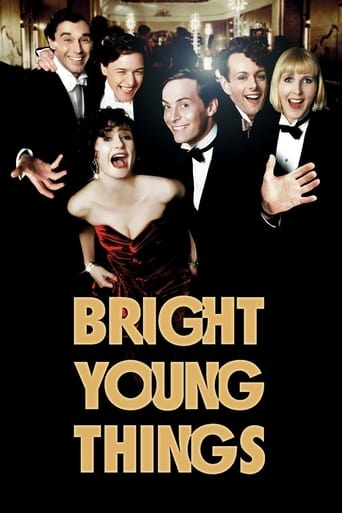

the leading man is my tpye
... View MoreGood , But It Is Overrated By Some
... View MoreThere is just so much movie here. For some it may be too much. But in the same secretly sarcastic way most telemarketers say the phrase, the title of this one is particularly apt.
... View MoreThe thing I enjoyed most about the film is the fact that it doesn't shy away from being a super-sized-cliche;
... View MoreBright Young Things concerns a group of bored rich twenty somethings, drinking, whoring and snorting drugs in the 1930s. Great idea, sadly with characters such as these I couldn't care less if the film started then all the characters line up and have a piano dropped on their heads. Credits. Rich, idle, bored. Sad tale eh, poor things. Sadly I was waiting for Mr Fry (himself a depressive rich bloke went to Cambridge etc) to show us how empty and soulless these imbeciles were. And I waited. One really obnoxious woman went potty and ended up in an asylum. Peter O'Toole appeared and wrote a cheque in the name of Charlie Chaplin, John Mills did some coke. Then the camp guy got caught with a bloke, then the writer won loads of money and give it to a drunk to put on a horse and spent the rest of the film trying to get it back and then...I went to the toilet so I must have missed the lesson to be learn-ed in all this. That the young born rich are indeed mindless idiots who have no aim or desire in life as they have had it all on a silver platter from the start. Still the war came. Then it all ended. It looked good though. I was a bit drunk at the time.
... View More"Bright Young Things" is a comedy that's never funny, a period piece that doesn't know what period it's in, and a party film that leaves you with the hangover.When writer-director Stephen Fry decided to make an adaptation of an Evelyn Waugh novel, he could have done himself a favor and not adapted "Vile Bodies." It's an episodic satire on the lives of a group of London club kids in the late 1920s that attempts to elicit laughter from the nasty ways they are run to ground by the world around them. The characters aren't meant for any deeper emotional investment than lab rats, though Fry seems to believe otherwise.At the center of the story, in both novel and film, is young Adam (Stephen Campbell Moore), who at the start of our story has lost his prized manuscript and is desperately trying to find new sources of funding with which to marry his lover Nina (Emily Mortimer). Opportunity comes in the form of an offer from publisher Lord Monomark (Dan Aykroyd) who wants Adam's help "tearing the lid off the young, idle, and rich.""I put Seignior Mussolini on the front page, no one buys a copy," he laments. "But a picture of one of your set in a nightclub, I can't print enough copies."The problem with both the novel and the film is this interesting idea is dropped almost before it begins, in favor of a number of other outrageous episodes which seem to act on the principle that anything can be made merry provided it moves fast enough. Like a strange major who makes off with some money Adam wanted to bet on a long-shot horse. Or a party that winds up finding themselves in the Prime Minister's residence. Or a car race that loses a wayward driver. All of this is drawn out as if it were funny merely by being incongruous.The film is worse on a few counts. First, Fry by necessity condenses the story but is at pains to include almost every character that appears in the book, as a way of facilitating assorted cameos that run from extraneous (Richard E. Grant as an angry Jesuit) to sad (John Mills as a mute coke sniffer). Second, he invests his version with an elegiac sadness that feels totally out of place in the second half. Nothing says comedy like a man sticking his head in an oven, or another tearfully discovering his homosexual lifestyle exposed.Even the main romance, a matter of crass opportunism in the book, is presented as a kind of real love story, even heroic as the Roaring '20s zip suddenly ahead to Dunkirk and the Blitz. Fry doesn't seem to trust either Waugh's wit or his own to make "Bright Young Things" work on comedic grounds, or else he really thinks the characters worth celebrating. The result is a doubled-down waste of our time.
... View MoreThe more things change the more they stay the same. London in the 1930's and the social scene is bustling. Adam is a writer of ambition but when his book gets confiscated by HM Customs he finds himself writing for Lord Monomark's paper as gossip columnist Mr Chatterbox. This involves him going to as many parties as possible and mixing with the rich bright young things of London society. While Adam attempts to get the money together to marry his girlfriend Nina he follows the ups and downs of this group.I have never read the book from which this came so I only came to this film as one comes to any other film and therefore had no expectations of what it should be or would be. The film follows the fortunes of the 1930's equivalent of the It crowd those without jobs who seem to live of money from somewhere to just continually party and appear in the papers. As such the narrative relies heavily on the characters and I must confess I didn't find many of them interesting enough to really engage me. That said the plot still works because the characters are lively and flamboyant enough to be interesting and amusing. The multi-talented Fry takes pleasure in showing us how things are no different now than they were then the public gobbles up tabloid gossip, the society parties are full of outrageous behaviour, sex and drug taking. With a modern eye it is fun to watch this although it perhaps isn't enough to make the whole film.Fry's debut as director shows him able as such even if some of his touches are a bit clumsy. The cast help him out greatly by delivering the goods from his script. Moore has the "straightest" character and the harder job of holding the narrative together but he does well and makes for an quite engaging character. Mortimer isn't used as well as I would have liked although she herself is pretty good. The rest of the cast are caricatures and outrageous types who perhaps don't add depth to the film but certainly make it fun. Tennant is good although the deliveries of Sheen and Woolgar naturally dominate. Quality is deep within the film even if some of Callow, Channing, Aykroyd, Mills and Grant are barely in it long enough to even be classed as cameos! Broadbent is a delight as a permanently sloshed major.Overall then an enjoyable film that makes for interesting viewing the way that modern society is reflected in 1930's society. The characters make for an OK story even if a lot of it is on the surface and very much of the moment (which I suppose might have been the point) and it is enjoyable even if it isn't that memorable.
... View MoreWatching Stephen Fry making his directorial debut is a little bit like watching a toddler the first time he rides a bike without stabilisers. Things are dangerously wobbly to begin with then smooth out nicely as self-belief grows before everything comes crashing down due to over-confidence. Based on Evelyn Waugh's 'Vile Bodies', this film chronicles the debauched lifestyle of a group of paradoxically penniless rich kids (i.e. they're mostly lords and ladies but have no visible means of income) in a Britain of the 30s that would be unrecognisable to all but the impoverished aristocracy. This is a rarefied world that no doubt existed and seemed real to the likes of Waugh but which is unrecognisable to the majority of British people. Without doubt, however, this movie, in its representation of that period and lifestyle, provides us with an absorbing and entertaining tale.Apart from our hero Adam Fenwick-Symes (Stephen Campbell Moore, another débutant giving a good account of himself) the characters in this film aren't so much introduced as wander in like party guests you drunkenly met in another room ten minutes ago. They all share a propensity for decadence, and the affectation of declaring most everything to be a frantic bore, and are all, without exception, empty shells. We've seen it all before in the likes of Brideshead Revisited and The Sun Also Rises, but Fry manages to keep us hooked despite the clumsy manner in which he films those opening scenes. Perhaps it's because of the sumptuous production design that captures the feel of these bright young things' hedonistic lifestyle, or perhaps it's because of the amiably random manner in which Fry begins to pull the threads of his story together. Either way, despite Fry's apparent determination to use every scene transition known to the film world, and to make use of at least a little snippet from each of a multitude of cameras used to shoot many scenes, the story manages to hold your attention and drag you along with it, leaving you asking yourself why you're interested in a bunch of characters who are all about as deep as lemon peel.The story and the characters follow a predictable arc, but Fry fills the film with enough detail and ingenuity to at least keep us entertained. A host of famous faces provide a series of cameos that last little more than seconds in some cases and this is without doubt the only film in which you will see the redoubtable Sir John Mills snorting cocaine. Fenella Woolgar outshines everybody in her scenes as the agreeably dippy cokehead Agatha, who brings a whole new meaning to the term 'powdering one's nose' and eventually parties herself into an insane asylum. In a role that strays into parody every now and then, she manages to provide a brief glimpse of a lost soul behind the party face, and her 'dream' speech pretty much sums up the entire social scene in which the characters are embroiled. James McAvoy, as the ill-fated Lord Balcairn (AKA Mr. Chatterbox) also stands out in one of few sympathetic roles.The film loses its momentum in the final act, when Fry moves from adapting Waugh's story to altering it completely, and we are left with an ending that is not only contrived but stretches credibility beyond its limits. Having managed to have steered a path that at least avoided conventionality in terms of plot, Fry suddenly makes a complete about-turn and presents us with a finale that stands out as a monumental piece of misjudgement. Perhaps Waugh's ending was too downbeat for the backers. It's a shame if that is the case, because it will mean that Fry most likely compromised himself. Somewhere down the line someone needs to show an ounce of integrity and fight for an ending that is true to the nature of the story, rather than compromising with a soap-opera climax that tarnishes the good work that has gone before.Bottom line: BRIGHT YOUNG THINGS is a worthy directorial debut from Stephen Fry and, while it's no classic, has a lot going for it. It's probably not worth seeking out, but if it happens to cross your path it's definitely worth watching. Just be sure to stop watching after the war scenes .
... View More